Legal System for Business: An Analysis of UK Laws & Employment Duties
VerifiedAdded on 2023/06/12
|9
|2370
|268
Report
AI Summary
This report provides an overview of the UK legal system, focusing on business and employment law. It discusses the classification of laws, the roles of the High Court and Supreme Court, and the sources of law, including case law and legislation. The report also examines delegated legislation and the UK law-making process, with specific attention to employment law, statutory duties of employers, and wrongful and unfair dismissal actions. The document concludes by emphasizing the importance of equal application of laws and highlighting the various aspects of the legal system covered in the report.
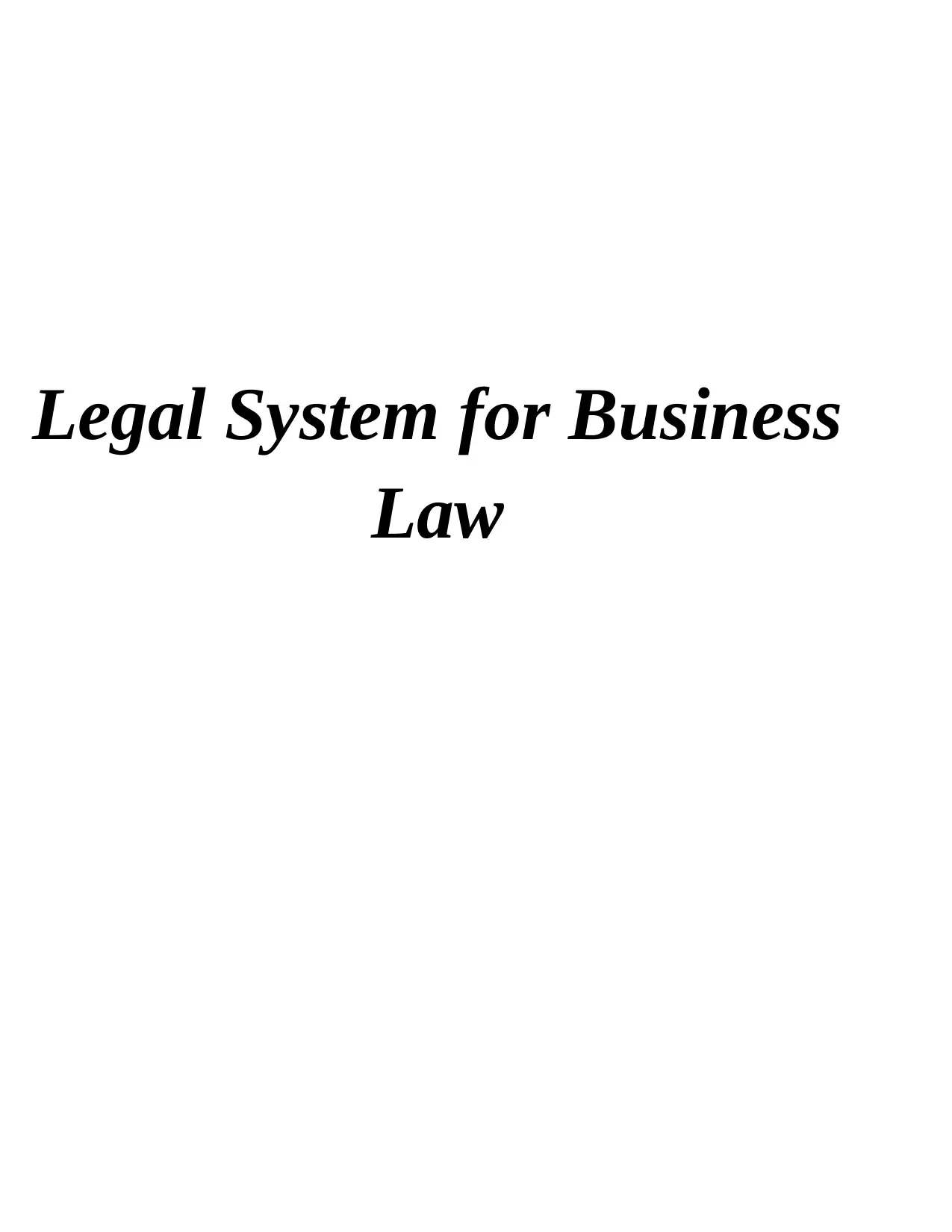
Legal System for Business
Law
Law
Paraphrase This Document
Need a fresh take? Get an instant paraphrase of this document with our AI Paraphraser
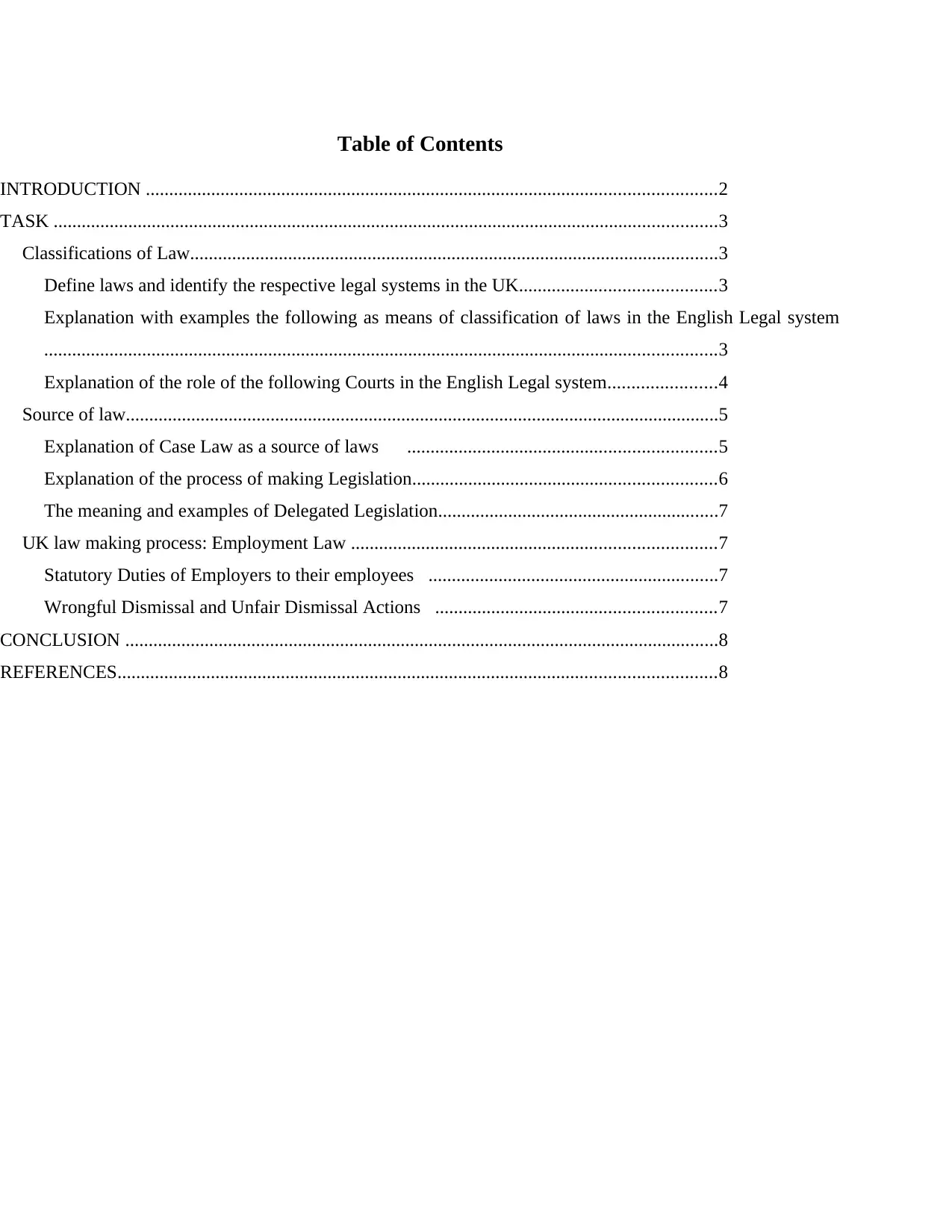
Table of Contents
INTRODUCTION ..........................................................................................................................2
TASK ..............................................................................................................................................3
Classifications of Law.................................................................................................................3
Define laws and identify the respective legal systems in the UK..........................................3
Explanation with examples the following as means of classification of laws in the English Legal system
................................................................................................................................................3
Explanation of the role of the following Courts in the English Legal system.......................4
Source of law...............................................................................................................................5
Explanation of Case Law as a source of laws ..................................................................5
Explanation of the process of making Legislation.................................................................6
The meaning and examples of Delegated Legislation............................................................7
UK law making process: Employment Law ..............................................................................7
Statutory Duties of Employers to their employees ..............................................................7
Wrongful Dismissal and Unfair Dismissal Actions ............................................................7
CONCLUSION ...............................................................................................................................8
REFERENCES................................................................................................................................8
INTRODUCTION ..........................................................................................................................2
TASK ..............................................................................................................................................3
Classifications of Law.................................................................................................................3
Define laws and identify the respective legal systems in the UK..........................................3
Explanation with examples the following as means of classification of laws in the English Legal system
................................................................................................................................................3
Explanation of the role of the following Courts in the English Legal system.......................4
Source of law...............................................................................................................................5
Explanation of Case Law as a source of laws ..................................................................5
Explanation of the process of making Legislation.................................................................6
The meaning and examples of Delegated Legislation............................................................7
UK law making process: Employment Law ..............................................................................7
Statutory Duties of Employers to their employees ..............................................................7
Wrongful Dismissal and Unfair Dismissal Actions ............................................................7
CONCLUSION ...............................................................................................................................8
REFERENCES................................................................................................................................8
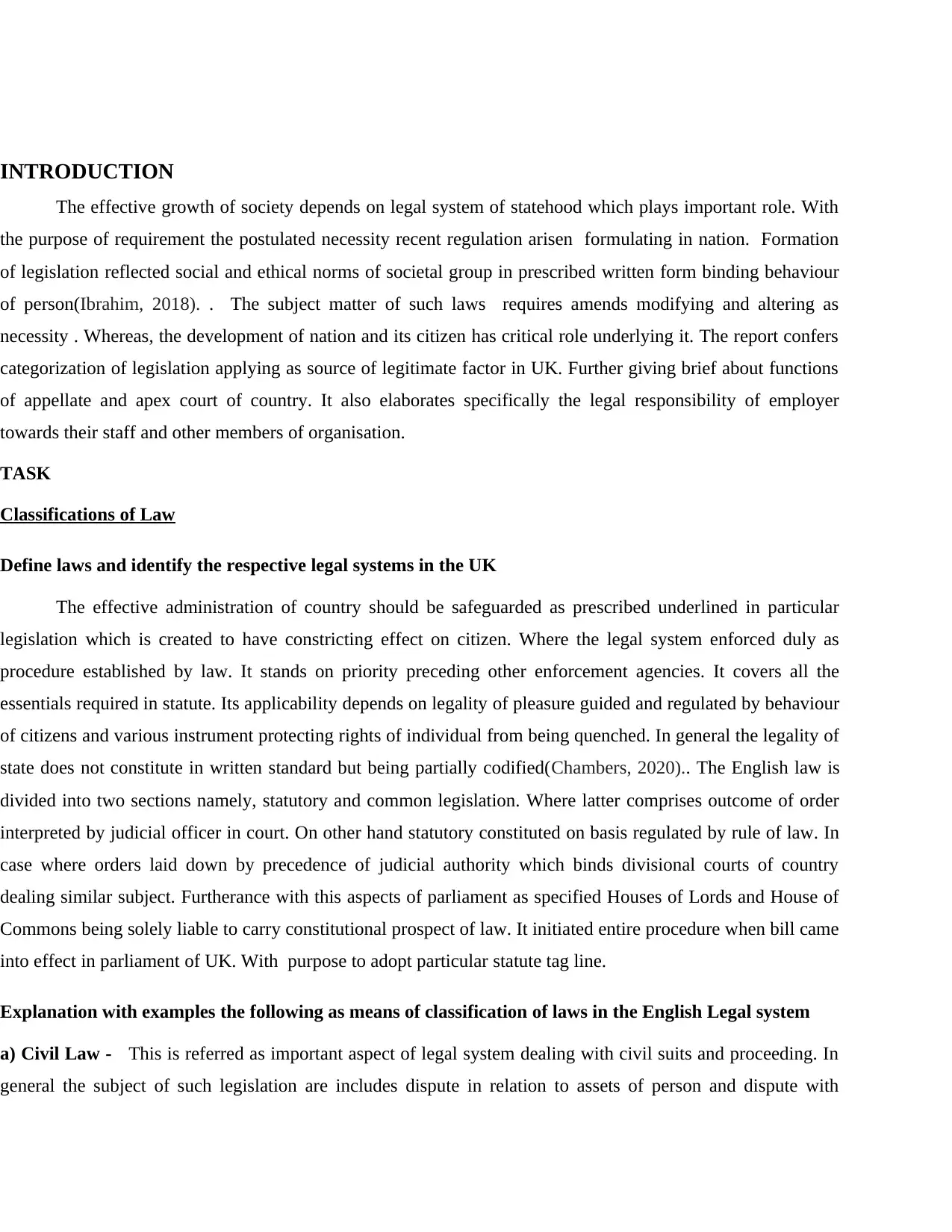
INTRODUCTION
The effective growth of society depends on legal system of statehood which plays important role. With
the purpose of requirement the postulated necessity recent regulation arisen formulating in nation. Formation
of legislation reflected social and ethical norms of societal group in prescribed written form binding behaviour
of person(Ibrahim, 2018). . The subject matter of such laws requires amends modifying and altering as
necessity . Whereas, the development of nation and its citizen has critical role underlying it. The report confers
categorization of legislation applying as source of legitimate factor in UK. Further giving brief about functions
of appellate and apex court of country. It also elaborates specifically the legal responsibility of employer
towards their staff and other members of organisation.
TASK
Classifications of Law
Define laws and identify the respective legal systems in the UK
The effective administration of country should be safeguarded as prescribed underlined in particular
legislation which is created to have constricting effect on citizen. Where the legal system enforced duly as
procedure established by law. It stands on priority preceding other enforcement agencies. It covers all the
essentials required in statute. Its applicability depends on legality of pleasure guided and regulated by behaviour
of citizens and various instrument protecting rights of individual from being quenched. In general the legality of
state does not constitute in written standard but being partially codified(Chambers, 2020).. The English law is
divided into two sections namely, statutory and common legislation. Where latter comprises outcome of order
interpreted by judicial officer in court. On other hand statutory constituted on basis regulated by rule of law. In
case where orders laid down by precedence of judicial authority which binds divisional courts of country
dealing similar subject. Furtherance with this aspects of parliament as specified Houses of Lords and House of
Commons being solely liable to carry constitutional prospect of law. It initiated entire procedure when bill came
into effect in parliament of UK. With purpose to adopt particular statute tag line.
Explanation with examples the following as means of classification of laws in the English Legal system
a) Civil Law - This is referred as important aspect of legal system dealing with civil suits and proceeding. In
general the subject of such legislation are includes dispute in relation to assets of person and dispute with
The effective growth of society depends on legal system of statehood which plays important role. With
the purpose of requirement the postulated necessity recent regulation arisen formulating in nation. Formation
of legislation reflected social and ethical norms of societal group in prescribed written form binding behaviour
of person(Ibrahim, 2018). . The subject matter of such laws requires amends modifying and altering as
necessity . Whereas, the development of nation and its citizen has critical role underlying it. The report confers
categorization of legislation applying as source of legitimate factor in UK. Further giving brief about functions
of appellate and apex court of country. It also elaborates specifically the legal responsibility of employer
towards their staff and other members of organisation.
TASK
Classifications of Law
Define laws and identify the respective legal systems in the UK
The effective administration of country should be safeguarded as prescribed underlined in particular
legislation which is created to have constricting effect on citizen. Where the legal system enforced duly as
procedure established by law. It stands on priority preceding other enforcement agencies. It covers all the
essentials required in statute. Its applicability depends on legality of pleasure guided and regulated by behaviour
of citizens and various instrument protecting rights of individual from being quenched. In general the legality of
state does not constitute in written standard but being partially codified(Chambers, 2020).. The English law is
divided into two sections namely, statutory and common legislation. Where latter comprises outcome of order
interpreted by judicial officer in court. On other hand statutory constituted on basis regulated by rule of law. In
case where orders laid down by precedence of judicial authority which binds divisional courts of country
dealing similar subject. Furtherance with this aspects of parliament as specified Houses of Lords and House of
Commons being solely liable to carry constitutional prospect of law. It initiated entire procedure when bill came
into effect in parliament of UK. With purpose to adopt particular statute tag line.
Explanation with examples the following as means of classification of laws in the English Legal system
a) Civil Law - This is referred as important aspect of legal system dealing with civil suits and proceeding. In
general the subject of such legislation are includes dispute in relation to assets of person and dispute with
⊘ This is a preview!⊘
Do you want full access?
Subscribe today to unlock all pages.

Trusted by 1+ million students worldwide
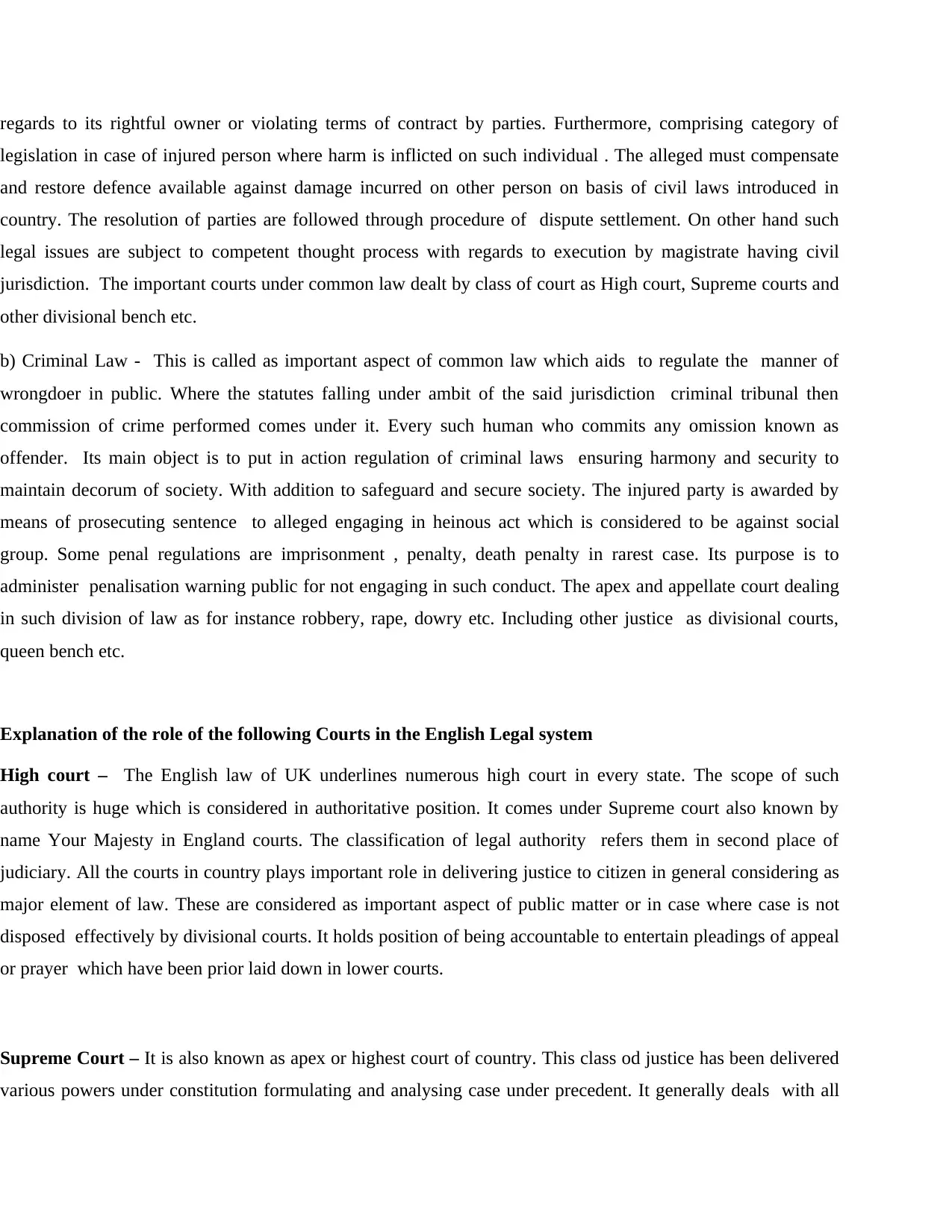
regards to its rightful owner or violating terms of contract by parties. Furthermore, comprising category of
legislation in case of injured person where harm is inflicted on such individual . The alleged must compensate
and restore defence available against damage incurred on other person on basis of civil laws introduced in
country. The resolution of parties are followed through procedure of dispute settlement. On other hand such
legal issues are subject to competent thought process with regards to execution by magistrate having civil
jurisdiction. The important courts under common law dealt by class of court as High court, Supreme courts and
other divisional bench etc.
b) Criminal Law - This is called as important aspect of common law which aids to regulate the manner of
wrongdoer in public. Where the statutes falling under ambit of the said jurisdiction criminal tribunal then
commission of crime performed comes under it. Every such human who commits any omission known as
offender. Its main object is to put in action regulation of criminal laws ensuring harmony and security to
maintain decorum of society. With addition to safeguard and secure society. The injured party is awarded by
means of prosecuting sentence to alleged engaging in heinous act which is considered to be against social
group. Some penal regulations are imprisonment , penalty, death penalty in rarest case. Its purpose is to
administer penalisation warning public for not engaging in such conduct. The apex and appellate court dealing
in such division of law as for instance robbery, rape, dowry etc. Including other justice as divisional courts,
queen bench etc.
Explanation of the role of the following Courts in the English Legal system
High court – The English law of UK underlines numerous high court in every state. The scope of such
authority is huge which is considered in authoritative position. It comes under Supreme court also known by
name Your Majesty in England courts. The classification of legal authority refers them in second place of
judiciary. All the courts in country plays important role in delivering justice to citizen in general considering as
major element of law. These are considered as important aspect of public matter or in case where case is not
disposed effectively by divisional courts. It holds position of being accountable to entertain pleadings of appeal
or prayer which have been prior laid down in lower courts.
Supreme Court – It is also known as apex or highest court of country. This class od justice has been delivered
various powers under constitution formulating and analysing case under precedent. It generally deals with all
legislation in case of injured person where harm is inflicted on such individual . The alleged must compensate
and restore defence available against damage incurred on other person on basis of civil laws introduced in
country. The resolution of parties are followed through procedure of dispute settlement. On other hand such
legal issues are subject to competent thought process with regards to execution by magistrate having civil
jurisdiction. The important courts under common law dealt by class of court as High court, Supreme courts and
other divisional bench etc.
b) Criminal Law - This is called as important aspect of common law which aids to regulate the manner of
wrongdoer in public. Where the statutes falling under ambit of the said jurisdiction criminal tribunal then
commission of crime performed comes under it. Every such human who commits any omission known as
offender. Its main object is to put in action regulation of criminal laws ensuring harmony and security to
maintain decorum of society. With addition to safeguard and secure society. The injured party is awarded by
means of prosecuting sentence to alleged engaging in heinous act which is considered to be against social
group. Some penal regulations are imprisonment , penalty, death penalty in rarest case. Its purpose is to
administer penalisation warning public for not engaging in such conduct. The apex and appellate court dealing
in such division of law as for instance robbery, rape, dowry etc. Including other justice as divisional courts,
queen bench etc.
Explanation of the role of the following Courts in the English Legal system
High court – The English law of UK underlines numerous high court in every state. The scope of such
authority is huge which is considered in authoritative position. It comes under Supreme court also known by
name Your Majesty in England courts. The classification of legal authority refers them in second place of
judiciary. All the courts in country plays important role in delivering justice to citizen in general considering as
major element of law. These are considered as important aspect of public matter or in case where case is not
disposed effectively by divisional courts. It holds position of being accountable to entertain pleadings of appeal
or prayer which have been prior laid down in lower courts.
Supreme Court – It is also known as apex or highest court of country. This class od justice has been delivered
various powers under constitution formulating and analysing case under precedent. It generally deals with all
Paraphrase This Document
Need a fresh take? Get an instant paraphrase of this document with our AI Paraphraser
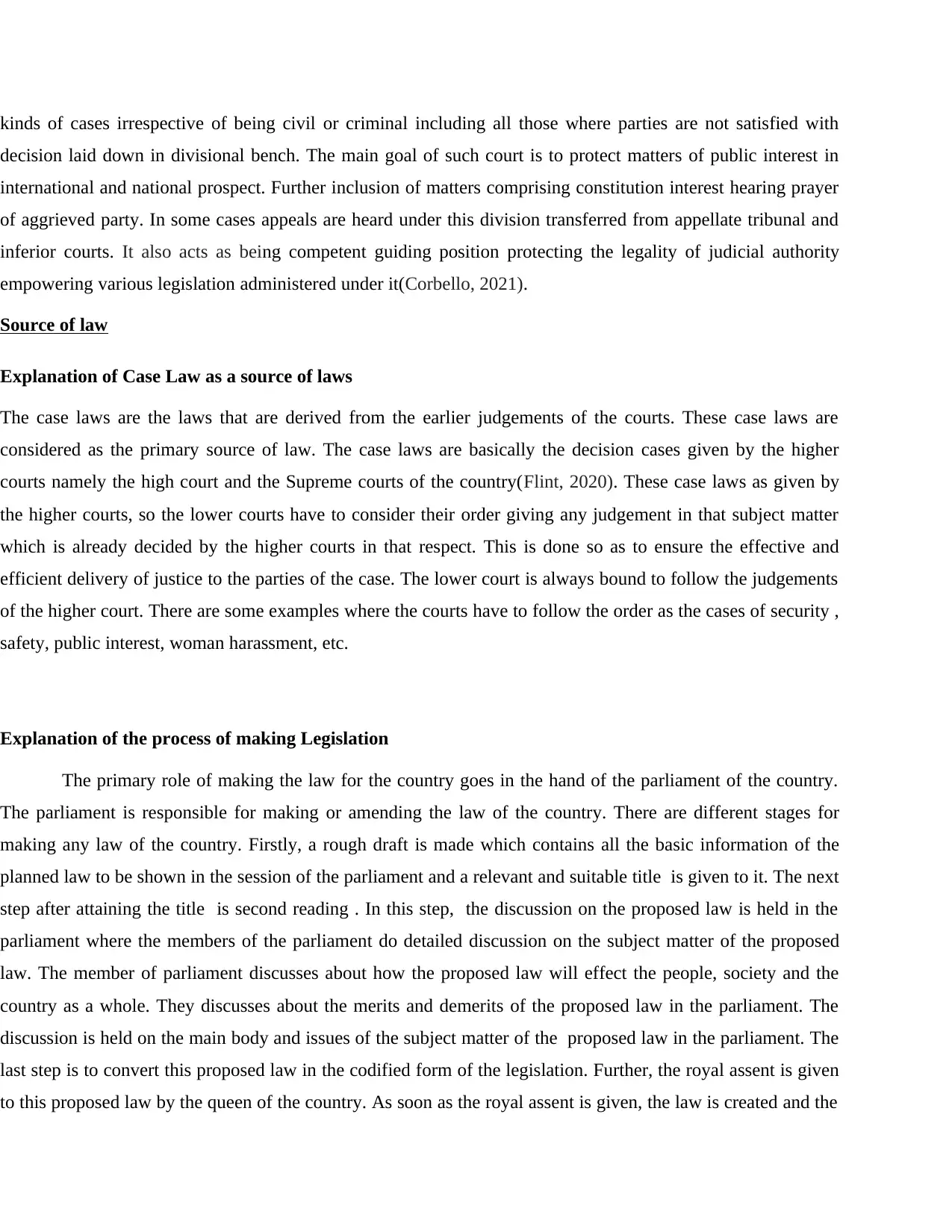
kinds of cases irrespective of being civil or criminal including all those where parties are not satisfied with
decision laid down in divisional bench. The main goal of such court is to protect matters of public interest in
international and national prospect. Further inclusion of matters comprising constitution interest hearing prayer
of aggrieved party. In some cases appeals are heard under this division transferred from appellate tribunal and
inferior courts. It also acts as being competent guiding position protecting the legality of judicial authority
empowering various legislation administered under it(Corbello, 2021).
Source of law
Explanation of Case Law as a source of laws
The case laws are the laws that are derived from the earlier judgements of the courts. These case laws are
considered as the primary source of law. The case laws are basically the decision cases given by the higher
courts namely the high court and the Supreme courts of the country(Flint, 2020). These case laws as given by
the higher courts, so the lower courts have to consider their order giving any judgement in that subject matter
which is already decided by the higher courts in that respect. This is done so as to ensure the effective and
efficient delivery of justice to the parties of the case. The lower court is always bound to follow the judgements
of the higher court. There are some examples where the courts have to follow the order as the cases of security ,
safety, public interest, woman harassment, etc.
Explanation of the process of making Legislation
The primary role of making the law for the country goes in the hand of the parliament of the country.
The parliament is responsible for making or amending the law of the country. There are different stages for
making any law of the country. Firstly, a rough draft is made which contains all the basic information of the
planned law to be shown in the session of the parliament and a relevant and suitable title is given to it. The next
step after attaining the title is second reading . In this step, the discussion on the proposed law is held in the
parliament where the members of the parliament do detailed discussion on the subject matter of the proposed
law. The member of parliament discusses about how the proposed law will effect the people, society and the
country as a whole. They discusses about the merits and demerits of the proposed law in the parliament. The
discussion is held on the main body and issues of the subject matter of the proposed law in the parliament. The
last step is to convert this proposed law in the codified form of the legislation. Further, the royal assent is given
to this proposed law by the queen of the country. As soon as the royal assent is given, the law is created and the
decision laid down in divisional bench. The main goal of such court is to protect matters of public interest in
international and national prospect. Further inclusion of matters comprising constitution interest hearing prayer
of aggrieved party. In some cases appeals are heard under this division transferred from appellate tribunal and
inferior courts. It also acts as being competent guiding position protecting the legality of judicial authority
empowering various legislation administered under it(Corbello, 2021).
Source of law
Explanation of Case Law as a source of laws
The case laws are the laws that are derived from the earlier judgements of the courts. These case laws are
considered as the primary source of law. The case laws are basically the decision cases given by the higher
courts namely the high court and the Supreme courts of the country(Flint, 2020). These case laws as given by
the higher courts, so the lower courts have to consider their order giving any judgement in that subject matter
which is already decided by the higher courts in that respect. This is done so as to ensure the effective and
efficient delivery of justice to the parties of the case. The lower court is always bound to follow the judgements
of the higher court. There are some examples where the courts have to follow the order as the cases of security ,
safety, public interest, woman harassment, etc.
Explanation of the process of making Legislation
The primary role of making the law for the country goes in the hand of the parliament of the country.
The parliament is responsible for making or amending the law of the country. There are different stages for
making any law of the country. Firstly, a rough draft is made which contains all the basic information of the
planned law to be shown in the session of the parliament and a relevant and suitable title is given to it. The next
step after attaining the title is second reading . In this step, the discussion on the proposed law is held in the
parliament where the members of the parliament do detailed discussion on the subject matter of the proposed
law. The member of parliament discusses about how the proposed law will effect the people, society and the
country as a whole. They discusses about the merits and demerits of the proposed law in the parliament. The
discussion is held on the main body and issues of the subject matter of the proposed law in the parliament. The
last step is to convert this proposed law in the codified form of the legislation. Further, the royal assent is given
to this proposed law by the queen of the country. As soon as the royal assent is given, the law is created and the
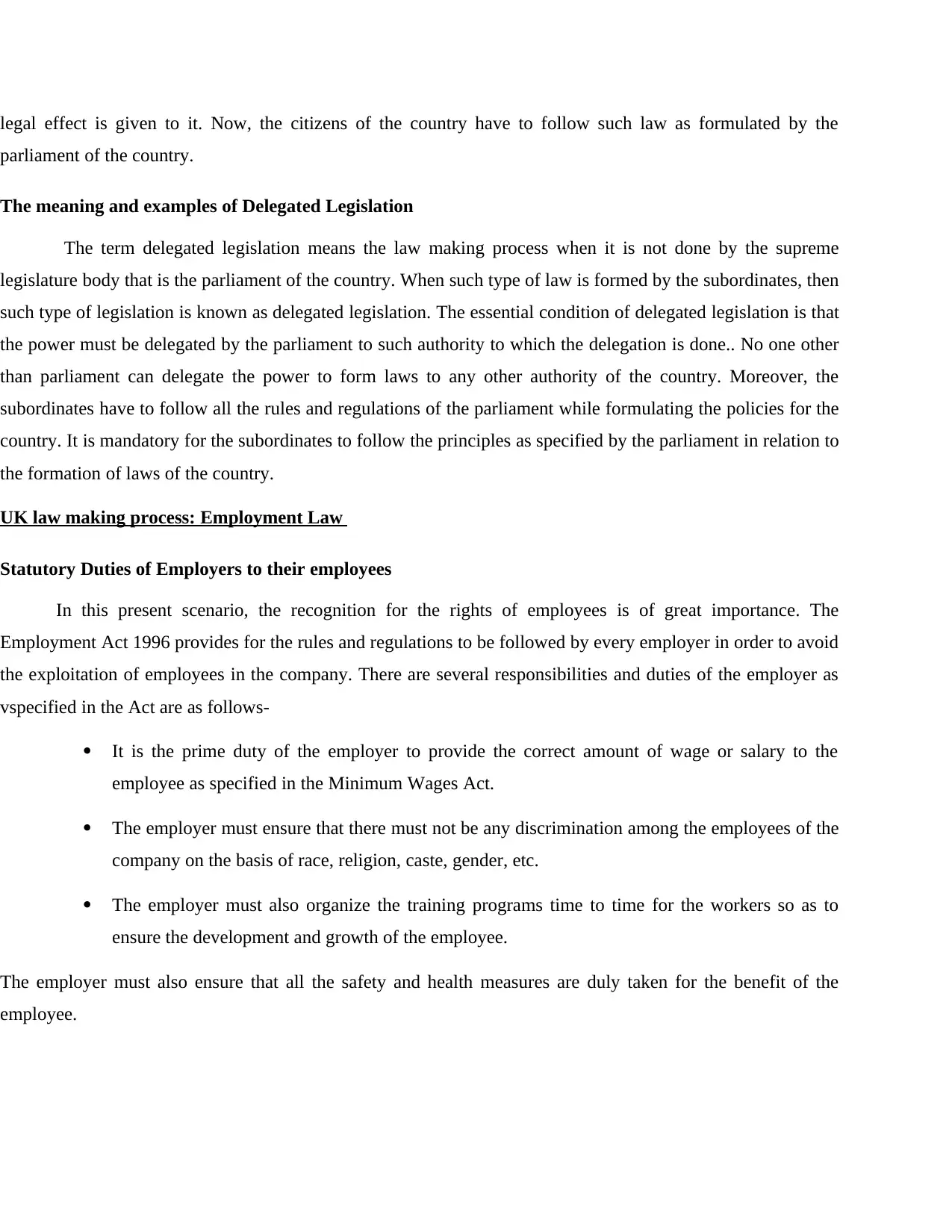
legal effect is given to it. Now, the citizens of the country have to follow such law as formulated by the
parliament of the country.
The meaning and examples of Delegated Legislation
The term delegated legislation means the law making process when it is not done by the supreme
legislature body that is the parliament of the country. When such type of law is formed by the subordinates, then
such type of legislation is known as delegated legislation. The essential condition of delegated legislation is that
the power must be delegated by the parliament to such authority to which the delegation is done.. No one other
than parliament can delegate the power to form laws to any other authority of the country. Moreover, the
subordinates have to follow all the rules and regulations of the parliament while formulating the policies for the
country. It is mandatory for the subordinates to follow the principles as specified by the parliament in relation to
the formation of laws of the country.
UK law making process: Employment Law
Statutory Duties of Employers to their employees
In this present scenario, the recognition for the rights of employees is of great importance. The
Employment Act 1996 provides for the rules and regulations to be followed by every employer in order to avoid
the exploitation of employees in the company. There are several responsibilities and duties of the employer as
vspecified in the Act are as follows-
It is the prime duty of the employer to provide the correct amount of wage or salary to the
employee as specified in the Minimum Wages Act.
The employer must ensure that there must not be any discrimination among the employees of the
company on the basis of race, religion, caste, gender, etc.
The employer must also organize the training programs time to time for the workers so as to
ensure the development and growth of the employee.
The employer must also ensure that all the safety and health measures are duly taken for the benefit of the
employee.
parliament of the country.
The meaning and examples of Delegated Legislation
The term delegated legislation means the law making process when it is not done by the supreme
legislature body that is the parliament of the country. When such type of law is formed by the subordinates, then
such type of legislation is known as delegated legislation. The essential condition of delegated legislation is that
the power must be delegated by the parliament to such authority to which the delegation is done.. No one other
than parliament can delegate the power to form laws to any other authority of the country. Moreover, the
subordinates have to follow all the rules and regulations of the parliament while formulating the policies for the
country. It is mandatory for the subordinates to follow the principles as specified by the parliament in relation to
the formation of laws of the country.
UK law making process: Employment Law
Statutory Duties of Employers to their employees
In this present scenario, the recognition for the rights of employees is of great importance. The
Employment Act 1996 provides for the rules and regulations to be followed by every employer in order to avoid
the exploitation of employees in the company. There are several responsibilities and duties of the employer as
vspecified in the Act are as follows-
It is the prime duty of the employer to provide the correct amount of wage or salary to the
employee as specified in the Minimum Wages Act.
The employer must ensure that there must not be any discrimination among the employees of the
company on the basis of race, religion, caste, gender, etc.
The employer must also organize the training programs time to time for the workers so as to
ensure the development and growth of the employee.
The employer must also ensure that all the safety and health measures are duly taken for the benefit of the
employee.
⊘ This is a preview!⊘
Do you want full access?
Subscribe today to unlock all pages.

Trusted by 1+ million students worldwide
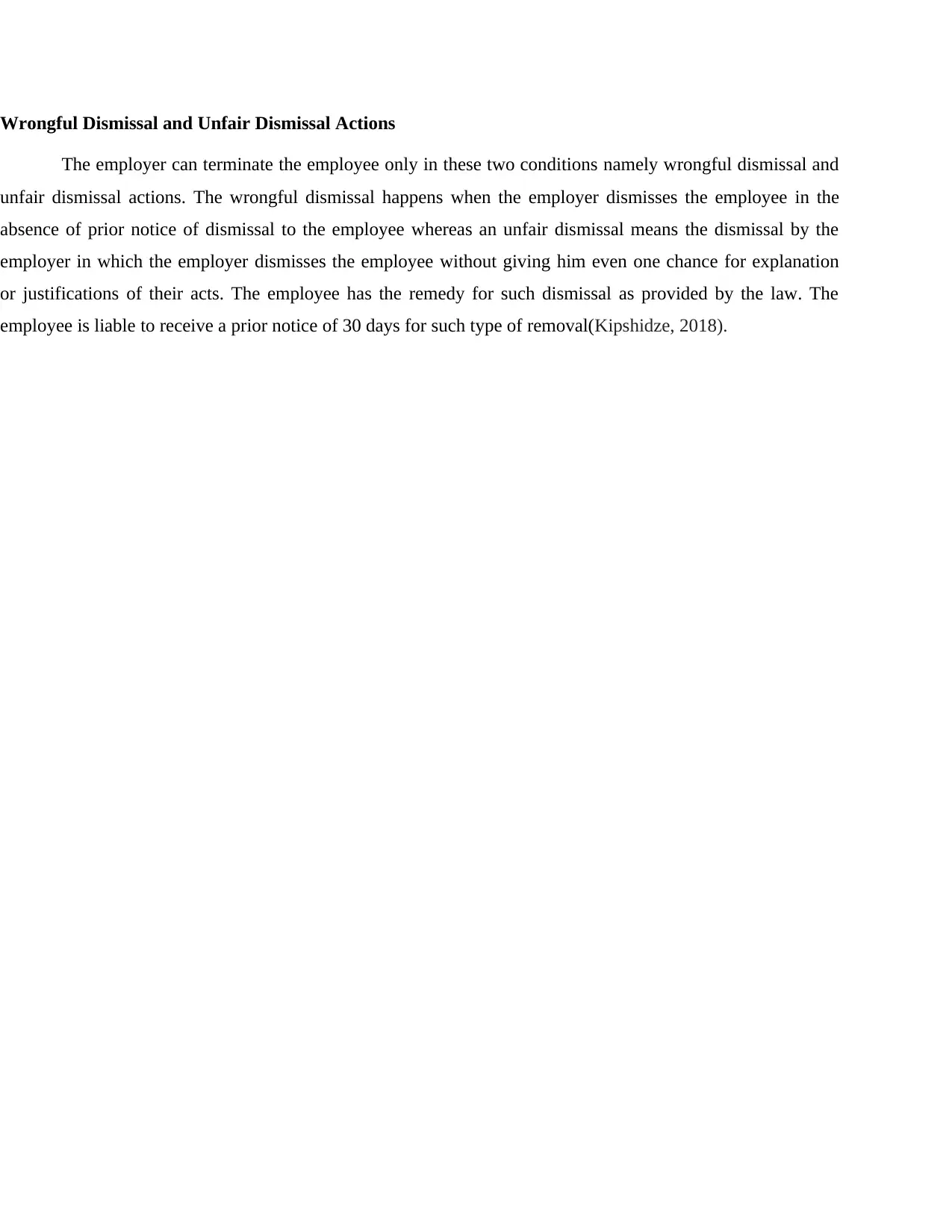
Wrongful Dismissal and Unfair Dismissal Actions
The employer can terminate the employee only in these two conditions namely wrongful dismissal and
unfair dismissal actions. The wrongful dismissal happens when the employer dismisses the employee in the
absence of prior notice of dismissal to the employee whereas an unfair dismissal means the dismissal by the
employer in which the employer dismisses the employee without giving him even one chance for explanation
or justifications of their acts. The employee has the remedy for such dismissal as provided by the law. The
employee is liable to receive a prior notice of 30 days for such type of removal(Kipshidze, 2018).
The employer can terminate the employee only in these two conditions namely wrongful dismissal and
unfair dismissal actions. The wrongful dismissal happens when the employer dismisses the employee in the
absence of prior notice of dismissal to the employee whereas an unfair dismissal means the dismissal by the
employer in which the employer dismisses the employee without giving him even one chance for explanation
or justifications of their acts. The employee has the remedy for such dismissal as provided by the law. The
employee is liable to receive a prior notice of 30 days for such type of removal(Kipshidze, 2018).
Paraphrase This Document
Need a fresh take? Get an instant paraphrase of this document with our AI Paraphraser
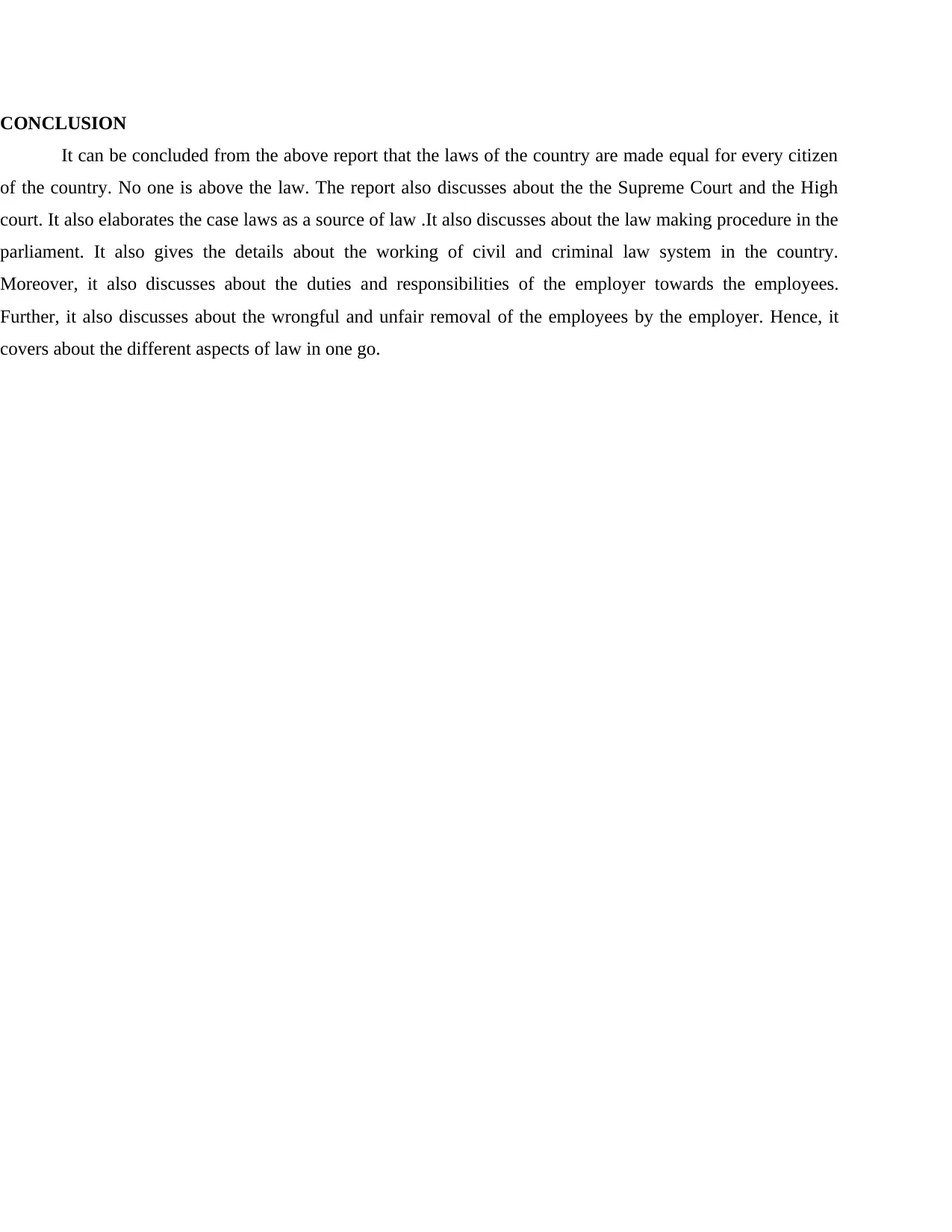
CONCLUSION
It can be concluded from the above report that the laws of the country are made equal for every citizen
of the country. No one is above the law. The report also discusses about the the Supreme Court and the High
court. It also elaborates the case laws as a source of law .It also discusses about the law making procedure in the
parliament. It also gives the details about the working of civil and criminal law system in the country.
Moreover, it also discusses about the duties and responsibilities of the employer towards the employees.
Further, it also discusses about the wrongful and unfair removal of the employees by the employer. Hence, it
covers about the different aspects of law in one go.
It can be concluded from the above report that the laws of the country are made equal for every citizen
of the country. No one is above the law. The report also discusses about the the Supreme Court and the High
court. It also elaborates the case laws as a source of law .It also discusses about the law making procedure in the
parliament. It also gives the details about the working of civil and criminal law system in the country.
Moreover, it also discusses about the duties and responsibilities of the employer towards the employees.
Further, it also discusses about the wrongful and unfair removal of the employees by the employer. Hence, it
covers about the different aspects of law in one go.
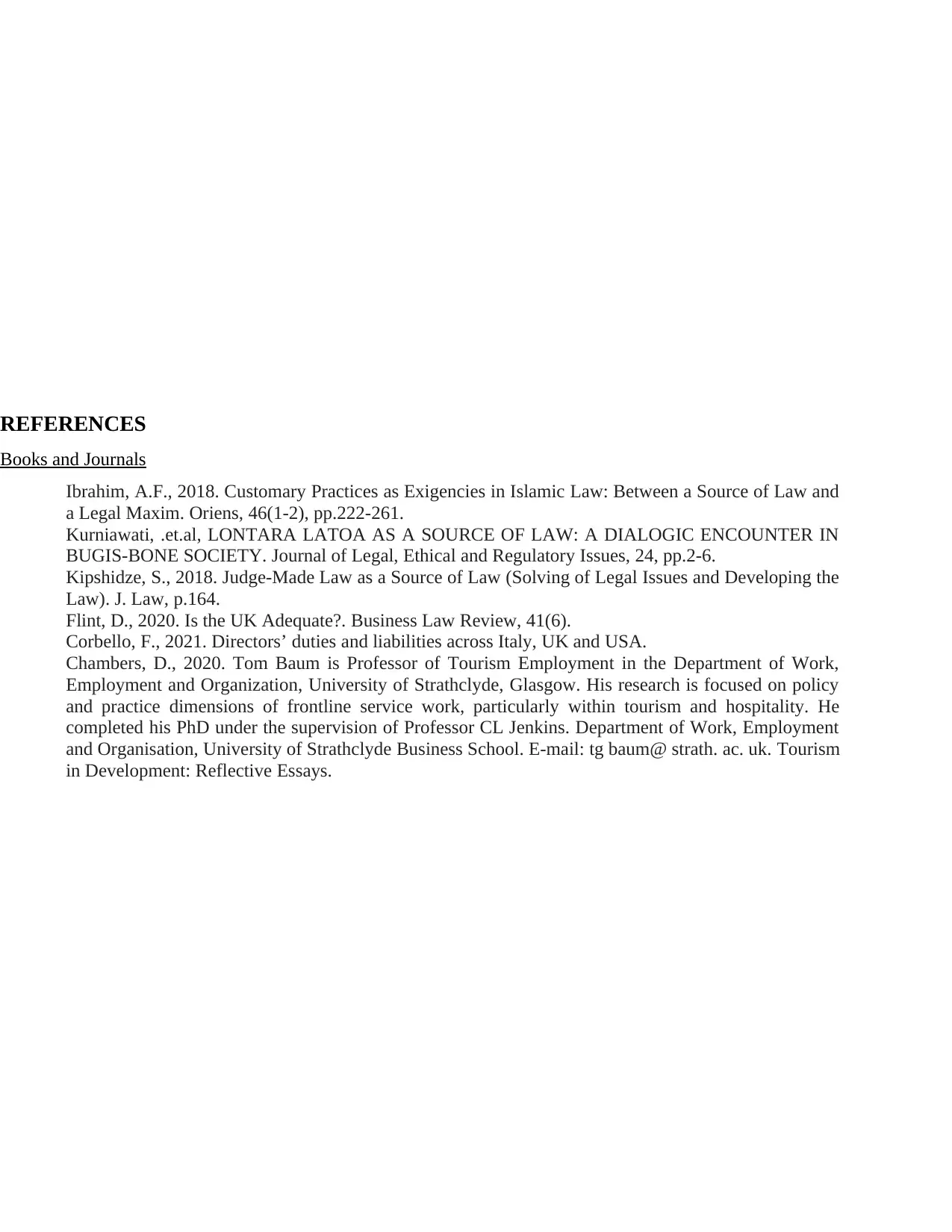
REFERENCES
Books and Journals
Ibrahim, A.F., 2018. Customary Practices as Exigencies in Islamic Law: Between a Source of Law and
a Legal Maxim. Oriens, 46(1-2), pp.222-261.
Kurniawati, .et.al, LONTARA LATOA AS A SOURCE OF LAW: A DIALOGIC ENCOUNTER IN
BUGIS-BONE SOCIETY. Journal of Legal, Ethical and Regulatory Issues, 24, pp.2-6.
Kipshidze, S., 2018. Judge-Made Law as a Source of Law (Solving of Legal Issues and Developing the
Law). J. Law, p.164.
Flint, D., 2020. Is the UK Adequate?. Business Law Review, 41(6).
Corbello, F., 2021. Directors’ duties and liabilities across Italy, UK and USA.
Chambers, D., 2020. Tom Baum is Professor of Tourism Employment in the Department of Work,
Employment and Organization, University of Strathclyde, Glasgow. His research is focused on policy
and practice dimensions of frontline service work, particularly within tourism and hospitality. He
completed his PhD under the supervision of Professor CL Jenkins. Department of Work, Employment
and Organisation, University of Strathclyde Business School. E-mail: tg baum@ strath. ac. uk. Tourism
in Development: Reflective Essays.
Books and Journals
Ibrahim, A.F., 2018. Customary Practices as Exigencies in Islamic Law: Between a Source of Law and
a Legal Maxim. Oriens, 46(1-2), pp.222-261.
Kurniawati, .et.al, LONTARA LATOA AS A SOURCE OF LAW: A DIALOGIC ENCOUNTER IN
BUGIS-BONE SOCIETY. Journal of Legal, Ethical and Regulatory Issues, 24, pp.2-6.
Kipshidze, S., 2018. Judge-Made Law as a Source of Law (Solving of Legal Issues and Developing the
Law). J. Law, p.164.
Flint, D., 2020. Is the UK Adequate?. Business Law Review, 41(6).
Corbello, F., 2021. Directors’ duties and liabilities across Italy, UK and USA.
Chambers, D., 2020. Tom Baum is Professor of Tourism Employment in the Department of Work,
Employment and Organization, University of Strathclyde, Glasgow. His research is focused on policy
and practice dimensions of frontline service work, particularly within tourism and hospitality. He
completed his PhD under the supervision of Professor CL Jenkins. Department of Work, Employment
and Organisation, University of Strathclyde Business School. E-mail: tg baum@ strath. ac. uk. Tourism
in Development: Reflective Essays.
⊘ This is a preview!⊘
Do you want full access?
Subscribe today to unlock all pages.

Trusted by 1+ million students worldwide
1 out of 9
Related Documents
Your All-in-One AI-Powered Toolkit for Academic Success.
+13062052269
info@desklib.com
Available 24*7 on WhatsApp / Email
![[object Object]](/_next/static/media/star-bottom.7253800d.svg)
Unlock your academic potential
Copyright © 2020–2026 A2Z Services. All Rights Reserved. Developed and managed by ZUCOL.


